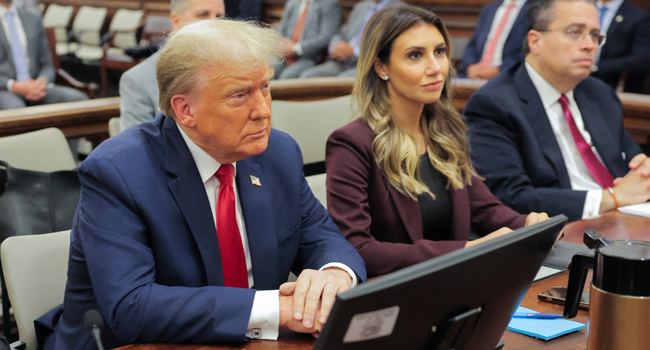Billionaires Sought To Help Fund Trump Bond In Civil Fraud Case, Sources Reveal
Some major Republican donors were working together to help U.S. presidential candidate, Donald Trump fund the original bond amount needed to cover his $454 million civil fraud judgment ahead of Monday’s deadline, three sources briefed on the matter told Reuters.
Former Republican President Trump needs to pay a bond in a New York civil case in which he was found liable for fraudulently inflating his net worth by billions of dollars to secure better loan and insurance terms.
On Monday he won a bid to delay the enforcement of the judgment if he posts a smaller $175 million bond within 10 days, but until that last-minute reprieve he appeared to be struggling to raise the original amount and risked having his properties seized.
Billionaire hedge fund founder John Paulson was involved in the behind-the-scenes effort by donors concerned about Trump’s legal woes and looking to help provide money toward the bond, two of the sources told Reuters. Oil and gas magnate Harold Hamm was also involved, one of those sources said.
The sources asked not to be identified in order to speak freely about the matter, which has not been previously reported.
Paulson, the founder of Paulson & Co, did not immediately respond to requests for comment. Reached by phone and asked about his involvement, Hamm, the founder of oil company Continental Resources (NYSE:CLR), appeared to hang up. A spokesperson for Hamm did not respond to requests for comment.
In response to a request for comment, Trump campaign spokesperson Steven Cheung said “there was no coordinated effort.” He added that Trump had “more than enough cash” to pay the judgment in full.
A fourth source, a Trump ally, said he had direct knowledge of one donor who offered more than $10 million toward the bond over the weekend, before being told it was not necessary.
After Monday’s court decision allowing a smaller bond, Trump said he would now be able to pay.
“I’ll post either the $175 million in cash or bonds or securities or whatever is necessary, very quickly,” Trump told reporters in New York.
Surety companies would have likely required Trump to post about $558 million in collateral for the original bond, or 120% of the judgment, according to Trump’s lawyers.
Full details of the billionaires’ efforts to raise funds, such as how much each donor had potentially pledged, were not immediately available. One source said the group had pooled the full amount originally due Monday. It was not clear whether the mega-donors would offer to help fund the new bond.
It was also unclear whether Trump would have to provide collateral or other guarantees to the benefactors.
The potential help from Trump’s billionaire allies shows that he retains some deep pocketed-support in his quest to win back the White House in the Nov. 5 presidential election against Democrat Joe Biden.
It also highlights how big donor money is playing a potentially different role in this presidential election as Trump faces a major financial squeeze amid multiple legal judgments and expenses.
Paulson and Hamm are both involved in an upcoming campaign fundraiser for Trump that is unrelated to the efforts around the bond. An invitation shows Paulson listed as a host and Hamm serving as a co-chair.
Funds raised at the April 6 event in Palm Beach, Florida, will go to Trump’s campaign, the Republican National Committee, state Republican parties and a group that has been paying some of Trump’s legal fees, according to the invitation.
Trump has talked about selecting Paulson as his Treasury secretary should he win the presidency, according to a separate source briefed on the matter.
LITTLE TRANSPARENCY ON BOND
There is no obligation to disclose the origins of funds obtained for a bond.
The terms of Trump’s $91.6 million bond for a defamation verdict in favor of writer E. Jean Carroll, for instance, were not disclosed. That bond was posted on March 8 by Federal Insurance Co, part of the insurer Chubb (NYSE:CB), which said it requires that bonds be fully collateralized.
In Trump’s civil fraud judgment, the bond would stave off the state’s seizure of his assets while he appeals Justice Arthur Engoron’s Feb. 16 judgment against him. A bonding company would be on the hook for any payout if Trump loses an appeal and proves unable to pay.
Donors helping to pay for Trump’s bonds could draw scrutiny from election regulators or federal prosecutors if the benefactors were to give Trump amounts exceeding campaign contribution limits.
While the payment would not be a direct donation to Trump’s campaign, federal laws broadly define political contributions as “anything of value” provided to a campaign.
Some 30 surety companies approached through four separate brokers turned down Trump’s attempts to secure the original bond needed to cover the $454 million judgment, his lawyers said earlier in March.
Had the pause not been granted and had Trump not able to post the original bond on Monday, New York Attorney General Letitia James could have asked a court to start seizing assets, including prized real estate holdings like 40 Wall Street in Manhattan.



Comments are closed.